The year was 1963.
The competition between the United States and the Soviet Union was escalating.
Tensions were boiling over into armed conflict in Southeast Asia.
But, no, this wasn’t the Vietnam War. Not yet. This was something else.
They called it Konfrontasi — Confrontation.
Few people alive today can remember this event now, but the stakes back then were incredibly high. This was a real turning point in our history:
- Sukarno, the socialist leader of Indonesia, had ordered his troops to cross over into Malaysia. The flashpoint was the contested border area within the island of Borneo. Sukarno felt confident in doing this because he was backed by the Soviet Union and the People’s Republic of China.
- But this wasn’t an invasion like what we saw during World War II, with mechanised sound and industrialised fury. Instead, this was a shadow war. An unconventional conflict fought through infiltration, subversion, and sabotage.
- Highly mobile soldiers operated in the humid tropical jungles of Borneo. They moved swiftly. They struck like lightning. They melted away into the rugged terrain. These ‘quiet professionals’ were embracing the new evolution of warfare — relying on speed, surprise, and violence of action.
- Fortunately, Malaysia was not alone in this struggle. The entire Commonwealth rallied and joined the fight — the United Kingdom, Australia, New Zealand, Canada, Brunei, and Singapore. The United States played a supporting role as well.
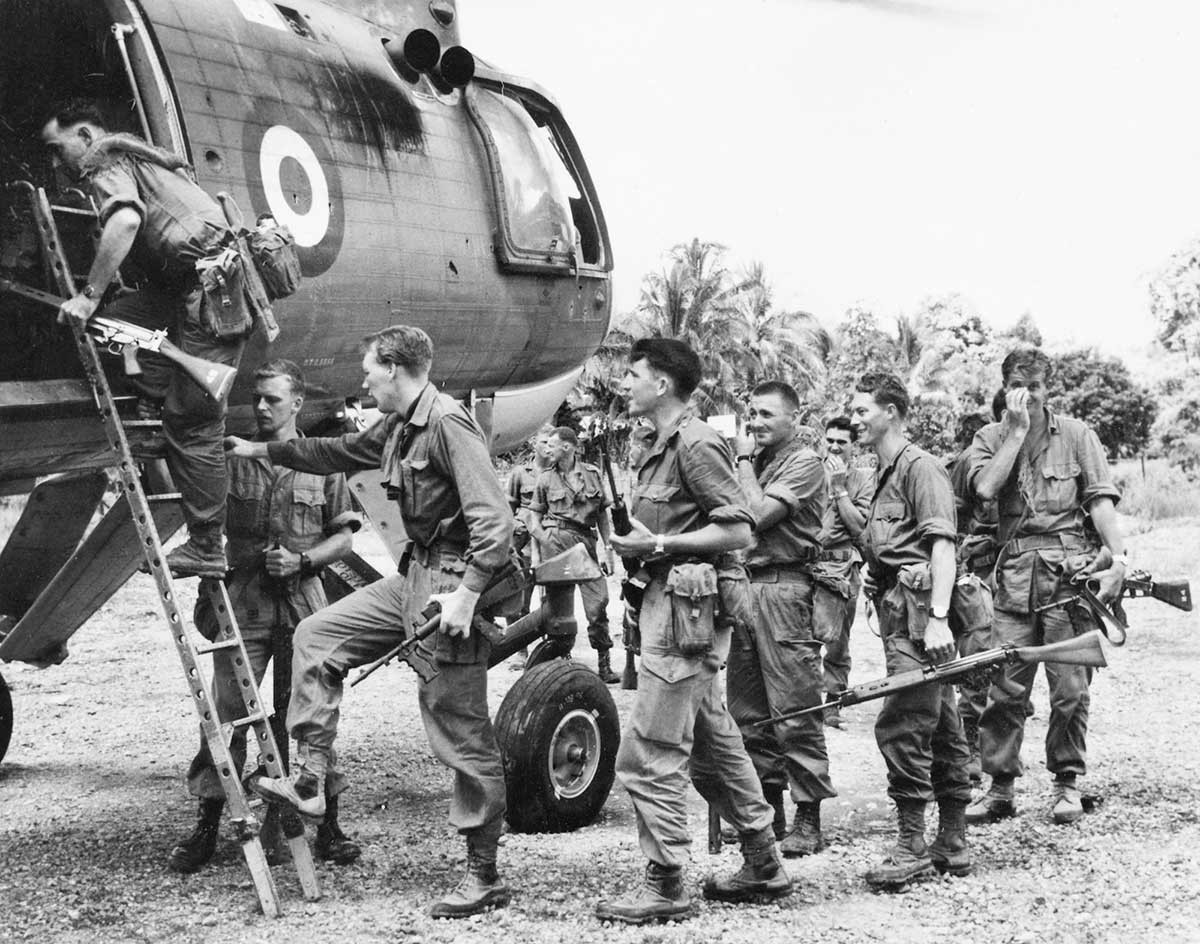
Australian soldiers embarking on a mission to search for Indonesian infiltrators.
Source: The National Museum of Australia.
President John F. Kennedy, himself a veteran of World War II, was perceptive enough to anticipate all this.
Just a year before, in 1962, Kennedy made a speech at West Point Military Academy. He explained that the world had changed radically. It was now experiencing a transition from total war to limited war:
‘Korea has not been the only battle ground since the end of the Second World War. Men have fought and died in Malaya, in Greece, in the Philippines, in Algeria and Cuba, and Cyprus and almost continuously on the Indo-Chinese Peninsula. No nuclear weapons have been fired. No massive nuclear retaliation has been considered appropriate.
‘This is another type of war, new in its intensity, ancient in its origin — war by guerrillas, subversives, insurgents, assassins, war by ambush instead of by combat; by infiltration, instead of aggression, seeking victory by eroding and exhausting the enemy instead of engaging him. It is a form of warfare uniquely adapted to what has been strangely called “wars of liberation,” to undermine the efforts of new and poor countries to maintain the freedom that they have finally achieved.
‘It preys on economic unrest and ethnic conflicts. It requires in those situations where we must counter it, and these are the kinds of challenges that will be before us in the next decade if freedom is to be saved, a whole new kind of strategy, a wholly different kind of force, and therefore a new and wholly different kind of military training.’
Indeed, just as Kennedy had predicted, ethnic conflict would play a key role in the Indonesia-Malaysia confrontation:
- Indonesian leader Sukarno believed in the concept of Melayu Raya. He wanted to unite all the Malay-speaking people in Southeast Asia under his socialist banner.
- However, Malaysia posed a direct challenge to Sukarno’s geopolitical vision — setting up an alternative democratic federation. This was made up of territories which included Malaya, Singapore, Sabah, and Sarawak.
- Sukarno was frustrated. To make matters worse, he was highly paranoid and anti-Western. He regarded Malaysia as a puppet state, designed to reinforce British and American influence in the region.
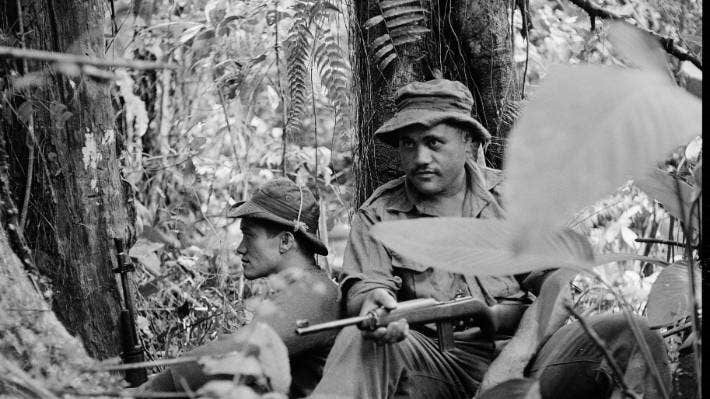
New Zealand soldiers showing vigilance on jungle patrol. Source: Stuff
As diplomatic ties broke down, Sukarno decided to act. He launched a campaign known as Ganyang Malaysia. Crush Malaysia. Tensions soon escalated into bloody conflict:
- Indonesian forces started to infiltrate and destabilise Sabah and Sarawak. There were bombings. There were assassinations. There were ambushes.
- Fierce firefights happened in towns throughout Malaysia as the Indonesians made repeated attempts to seize control of strategic areas — only to be beaten back again and again by Commonwealth forces.
- The Indonesians did not rely on military power alone. They also used psy ops — psychological operations. Propaganda was deployed in an attempt to sway the allegiances of the local population.
- Sabah and Sarawak had complex demographics. These territories had over 40 ethnic groups, and over 200 distinct sub-ethnic groups. The hearts and minds of these people were vulnerable and up for grabs.
- It’s important to note that Konfrontasi not just a direct conflict between Indonesia and Malaysia. It was also a proxy war between the Soviet Union and the United States. This was a battle of ideology. A battle of influence.
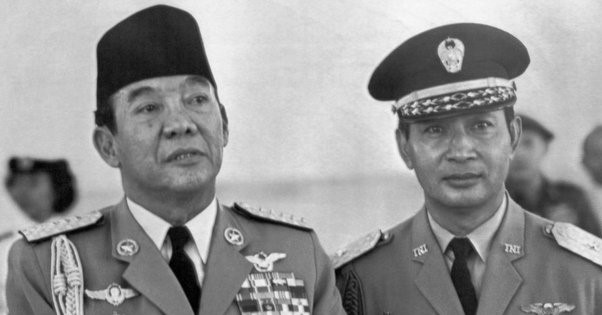
Sukarno and Suharto in happier times. Source: Quora
This struggle would rage on for three years. But, eventually, the Indonesia-Malaysia confrontation would come to a shocking end:
- In October 1965, the American CIA supported a military coup which succeeded in toppling Sukarno and installing a new leader: Suharto.
- Seemingly overnight, Indonesia veered from the socialist left to the authoritarian right.
- Unfortunately, this period of turbulence had ugly consequences. In what has been described as a mass killing, up to 1 million Indonesians died during a purge of suspected leftists.
- This happened because Suharto was determined to dismantle Sukarno’s legacy. By any means necessary. No stone was left unturned.
- By August 1966, Suharto had consolidated his hold on power. He decided that a conflict with Malaysia was no longer in his country’s best interests.
- A peace treaty between Indonesia and Malaysia was signed, ceasing hostilities. Diplomatic relations were restored. Konfrontasi was over.
A shadowy legacy?
The Indonesia-Malaysia confrontation was a momentous event for those who lived through it — but today, it remains a blind spot in our history:
- Despite the courage and valour shown by Commonwealth troops, Konfrontasi has become a forgotten war. It’s just one of the many proxy conflicts waged between the United States and the Soviet Union during the 20th century.
- As President Kennedy pointed out, no nuclear weapons were used. No grand military campaigns were launched. There was no mechanised sound and industrialised fury for the media to publicise.
- Nonetheless, the sacrifice and suffering endured by our troops during Konfrontasi shouldn’t be dimmed by the lack of publicity.
- A secret war — a shadow war — is still a war nonetheless.
- ‘Lest we forget.’
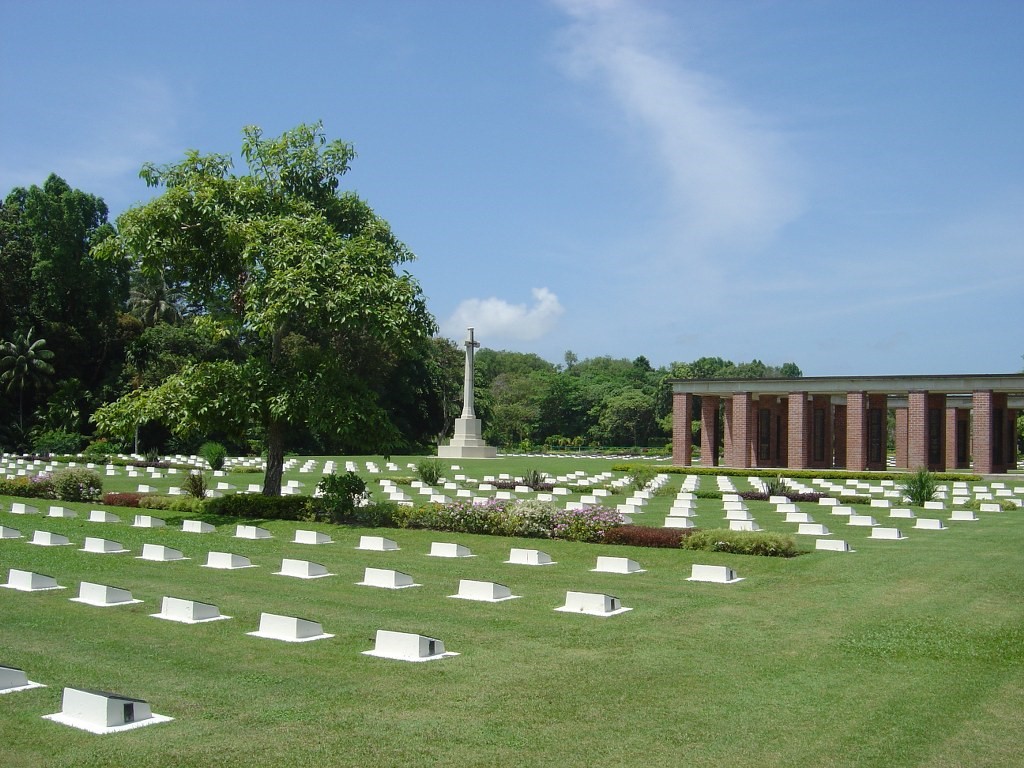
The Labuan War Cemetery in Sabah, Malaysia, where our fallen heroes lie interred.
Source: Commonwealth War Graves
It’s also important to note that the Indonesia-Malaysia confrontation set the template for other unconventional wars to come. Not just in the 20th century, but the 21st century as well:
- These days, people often speculate about the possibility of China invading Taiwan. And in their imagination, this will be a total war. Usually involving a big military campaign with mechanised sound and industrialised fury.
- The media tends to sensationalise such imagery. They do this because a negative headline will get 60% more clicks. And astonishingly enough, each additional scary word will increase the click-through rate by 2.3%.
- But, realistically, the truth is more layered and nuanced. What the media doesn’t usually talked about is an alternative scenario: a limited war. A shadow war fought through infiltration, subversion, and sabotage. Just like Konfrontasi.
- Remember: warfare isn’t an on/off switch. It’s not binary. Instead, it exists on a sliding scale: 1 to 10. But the dial is seldom set at 10. In fact, most of the time, the actual number is 1 or 2. It rarely rises beyond 5.
- Norman Podhoretz, a conservative political thinker, provides a compelling argument as to why total war has evolved into limited war. In his opinion, World War III was the Cold War. And World War IV was the War on Terror.
- This is the way the game of global brinkmanship is played now.
So, as value investors, we want to learn the correct lessons from the past.
Geopolitical shocks come. Geopolitical shocks go. But in the long run, they have surprisingly little impact on the trajectory of the market. Prosperity marches forward:
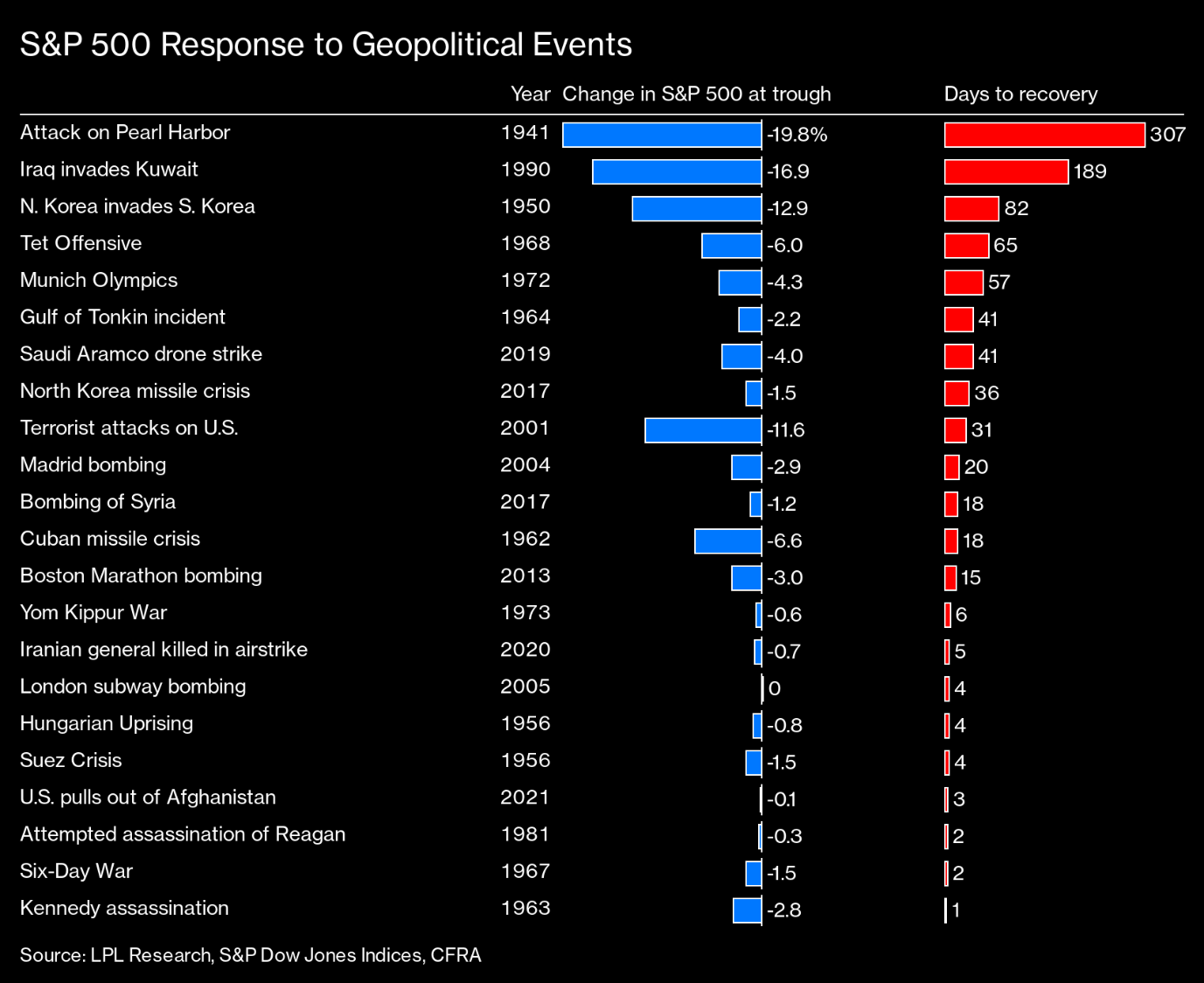
Source: LPL Research
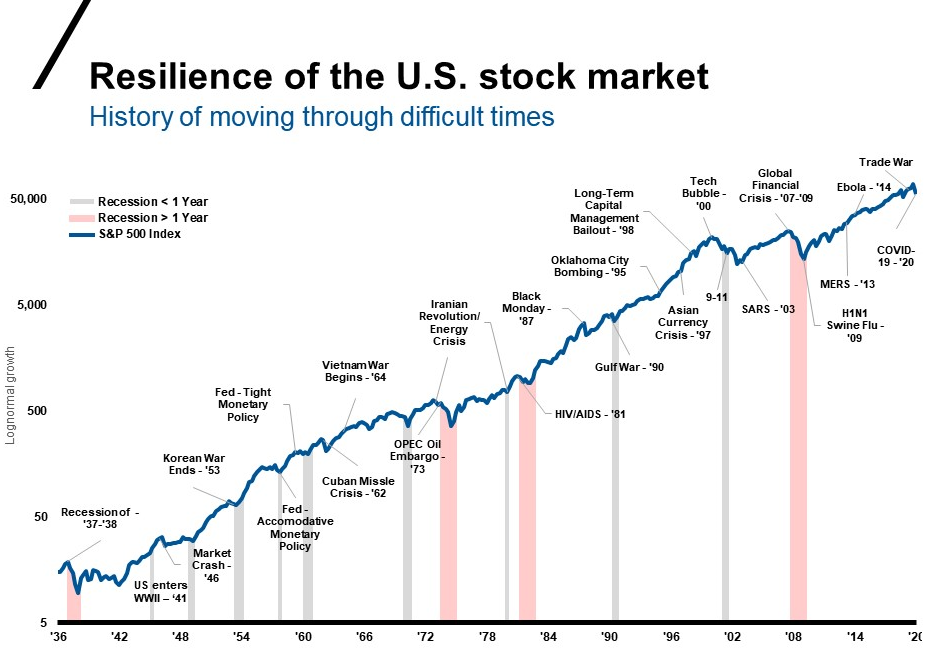
Source: Russell Investments
So, right now, here’s what you need to think about:
- Are you misreading the current cycle of history?
- Are you listening to prophets of doom making false prophecies?
- Are you forgetting that optimism will eventually win out over pessimism?
- Are you forgetting about the value available today?
- Are you ignoring the incredible assets being sold now at a sharp discount?
It’s time to have your say
I hope that you’ve enjoyed reading our articles as much as we’ve enjoyed writing them.
Your prosperity is our focus — which is why we are always working hard to uncover new opportunities beyond the radar for you.
By the way, I have a small favour to ask:
- Would you like to write a review of our work here at Wealth Morning?
- Do you want to let us know if our stories have inspired you in a positive way?
- Do you want to let us know if our stories have helped you become a more successful investor?
We truly value your feedback.
It encourages us. It helps us to do better. It helps us to reach further.
So, if you’d like to leave us a review, it’s quick and easy. It will only take two minutes of your time:
❤️ Please click here to review us now on Trustpilot.
Thank you so much in advance for your kindness and generosity.
Your readership keeps us going!
Regards,
John Ling
Analyst, Wealth Morning
(This article is general in nature and should not be construed as any financial or investment advice.)





John is the Chief Investment Officer at Wealth Morning. His responsibilities include trading, client service, and compliance. He is an experienced investor and portfolio manager, trading both on his own account and assisting with high net-worth clients. In addition to contributing financial and geopolitical articles to this site, John is a bestselling author in his own right. His international thrillers have appeared on the USA Today and Amazon bestseller lists.